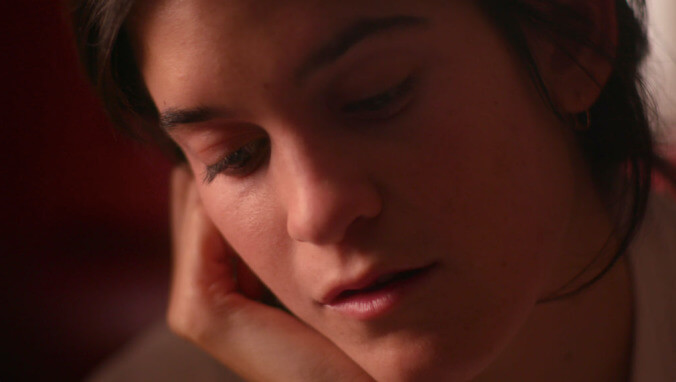Spring Blossom is the rare drama about teenage life made by an actual teenager


For decades, audiences watched Manhattan and were persuaded that a relationship between 16-year-old Mariel Hemingway and 44-year-old Woody Allen was wonderfully romantic. That’s the power of the male gaze, and it’s particularly insidious when applied to age-gap romances, where it can be used to gloss over the disturbing power dynamics at play, sometimes by painting teenage girls as seductresses and grown men as mere victims of their charms. So it’s a relief that Spring Blossom, a new drama about a teenager falling in love with an older man, steadfastly unfolds from the young woman’s perspective. It was, in fact, conceived from a teenage perspective, as its writer-director-star, Suzanne Lindon, penned the film when she was only 15 and then shot and appeared in it just four years later.
Lindon, the daughter of French actors Vincent Lindon and Sandrine Kiberlain, plays the 16-year-old protagonist. Suzanne, as she’s unimaginatively named, lives in Paris and is underwhelmed by her peers. She prefers grenadine and lemonade to beers passed around at parties and wears crisp white shirts instead of the flowery dresses her friends favor. Slightly awkward at first, Suzanne subtly blossoms over the course of the film, until by the final act when she possesses the extraordinary elegance Parisian women are seemingly gifted as they exit adolescence.
In creating material so close to her lived experience, Lindon is able to avoid the common clichés of teenage stories. Suzanne’s life has little conflict or excitement when we first meet her. School is fine but a little boring, and her home life is warm and gentle, her parents and sister lovingly teasing one another at the breakfast table. This entirely functional family feels subversive, given the context; Suzanne’s desire comes from a longing for romance rather than festering daddy issues, a need to escape, or any other rationale these kind of movies tend to provide for why a young woman might get involved with an older man.
Suzanne keeps catching glimpses of Raphael (Arnaud Valois), a handsome 35-year-old actor she sees broodily smoking outside a theater, playing with a knife outside a brasserie, and inspecting a Vespa. (In case it wasn’t clear, this film is extremely French). Her crush on him grows and soon progresses to stalking. The surprising turn comes when her feelings are reciprocated. The pair’s romance has the dreamy ethereal quality of first love, and also the emotional whiplash: Sometimes Suzanne is giddy, scarcely able to believe her luck, and other times the fundamental hopelessness of the relationship brings her crashing down to earth. The strength of Spring Blossom lies in its major tonal shifts, which are dictated by Suzanne’s evolving feelings about her romance.
There are scenes that break into whimsical choreography. After securing a first date, Suzanne pirouettes and shimmies down the street to euphoric pop music. Later, the couple sits in a café listening to classical music together, sparking a small synchronized interpretive dance. It’s a credit to Lindon’s assured direction that these heightened moments blend harmoniously with her otherwise naturalistic style. It’s not entirely dissimilar from the tricks pulled by (500) Days Of Summer, except this film is centered on a young woman’s self-discovery rather than a petulant man-child who won’t take no for an answer. Suzanne and Raphael’s relationship is convincing because the leads have great chemistry—at times their frisson is disturbingly electric. But Lindon keeps things chaste, at times frustratingly so. The hesitancy to show so much as a French kiss feels like a bit of a cop-out given the subject matter. Maybe Lindon was trying to avoid the discomfort of something like Manhattan, and how Allen perhaps inadvertently laid bare the enormous age gap between himself and Hemingway with a kiss (the actress’ first, on screen or off).
The last act of Spring Blossom is a little slight, and a little bit of a let down after all the lovely moments Lindon offers from both sides of the camera throughout. But this isn’t unusual for coming-of-age stories, where plot mechanics aren’t as crucial and there’s not always the easiest, clearest path to narrative closure, given the focus on the nebulous evolution of self that comes with growing up. The breezy 73-minute runtime suits the subject matter—so many people’s first romantic dalliances are as fleeting as they are intense. The film ultimately feels like only a glimmer of what Lindon is capable of. Like her character, she has her whole life ahead of her—all the time in the world to make something more lasting and substantial.